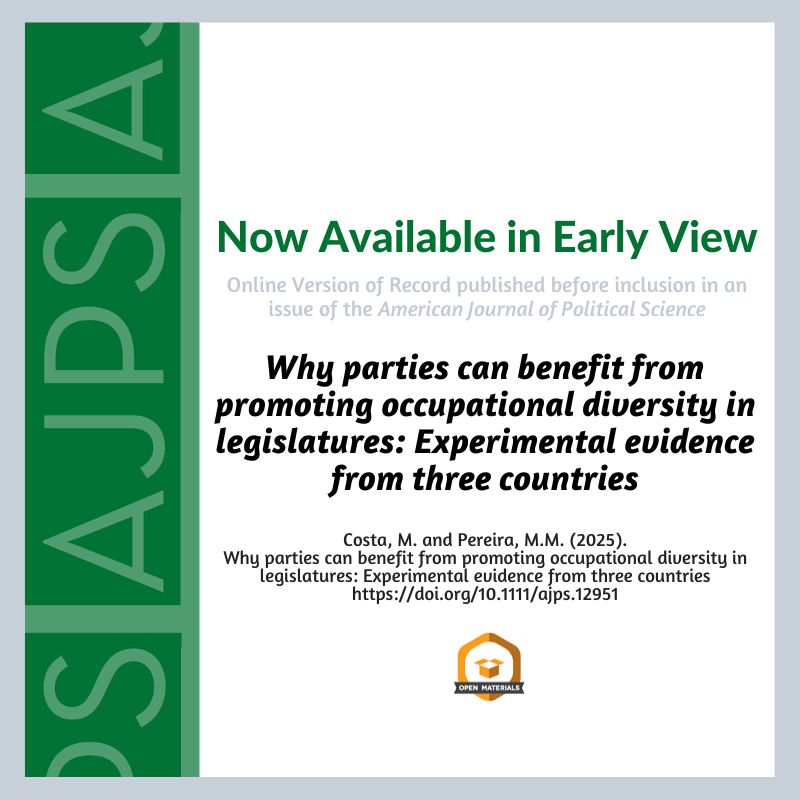Good info in this Experiments newsletter, including: AI/LLM respondents, conjoints in rural development settings, repeated measure designs, & when and why to prioritize data quality over representativeness (from me and John).
⬇️ I'll send you the pdf if link is gated. :)
29.08.2025 19:34 — 👍 1 🔁 0 💬 0 📌 0

screenshot of the top of the first page of the fall 2025 experiments section newsletter
There's a new issue of the section newsletter out! This one's on sample considerations in experiments: professional survey-takers, LLM usage, rural contexts, and more!
connect.apsanet.org/s42/newslett...
26.08.2025 15:08 — 👍 9 🔁 9 💬 1 📌 0
That'd be great. Sent a DM!
27.03.2025 19:07 — 👍 1 🔁 0 💬 0 📌 0
Thank you! 😀
27.03.2025 15:54 — 👍 1 🔁 0 💬 0 📌 0

Voters don't like when politicians use partisan attacks. But... they think the other side does.
"*I* may not thrive on partisan hostility, but others surely do."
This continues the cycle, leading to a breakdown in political trust and civility.
27.03.2025 13:05 — 👍 7 🔁 2 💬 1 📌 0


Politicians talk about policy a lot more than they make partisan attacks! But talking about the out-party gets way, way more attention.
Out-party language gets more likes and retweets, tv news coverage, and campaign donations.
27.03.2025 13:05 — 👍 6 🔁 2 💬 1 📌 1


Legislators who attack the other party are worse at their jobs.
Negative representation has clear implications for substantive representation. Both ideological extremity and ineffective lawmaking increase with out-party rhetoric.
27.03.2025 13:05 — 👍 3 🔁 0 💬 1 📌 0

Negative partisan rhetoric, while not as common as people think (or see), reinforces a cycle of polarization. And a lot of partisan language is actually completely absent from policy language, especially on Twitter. I show when and why it happens.
27.03.2025 13:05 — 👍 6 🔁 0 💬 2 📌 0

My book is now officially out! How Politicians Polarize introduces and documents the concept of "negative representation" – when representatives focus on the other side rather than their own.
Some key findings: 🧵
www.amazon.com/How-Politici...
27.03.2025 13:05 — 👍 98 🔁 42 💬 10 📌 4

5/6 🧵 In @ajpseditor.bsky.social @miacosta.bsky.social & @miguelpereira.bsky.social study how occupational backgrounds shape MPs' ability to garner support for their policies. Survey experiments in 🇩🇪 🇺🇸 🇸🇪. Find some experience credibility bonus among citizens & politicians. doi.org/pbhp
21.03.2025 07:32 — 👍 4 🔁 4 💬 1 📌 0

Why parties can benefit from promoting occupational diversity in legislatures: Experimental evidence from three countries by Mia Costa and Miguel M. Pereira is now available in Early View. @miacosta.bsky.social @miguelpereira.bsky.social ajps.org/2025/02/26/w...
27.02.2025 18:44 — 👍 16 🔁 6 💬 0 📌 0
This might create incentives for elites to stoke fears about other side. But it could also result in less polarized candidates if otherwise ideological prim voters elevate other considerations. Of course this is all conditional on having a competitive general election & good info about electability
19.11.2024 15:01 — 👍 2 🔁 2 💬 0 📌 0
We suspect (but don't test) that this helps explain primary dynamics like Biden in 2020. This was the original motivation for the project. Fear and hatred of the other side elevates stakes of election, which in turn elevates importance of electability/elite cues about this trait in nominations
19.11.2024 14:59 — 👍 2 🔁 2 💬 1 📌 0

Here we show results from 2 conjoints. 1) shows marginal effect of being "likely to win" (vs lose) on vote choice based on out-party ratings, controlling for ideology alignment. 2) shows win vs. toss up, controlling for policy agreement. Electability always matters most for negative partisans
19.11.2024 14:55 — 👍 2 🔁 2 💬 1 📌 0
Republicans who stand up to Trump are regularly terrorized by their fellow partisans. It’s a commonly known consequence, but we don’t hear much about it.
27.09.2024 13:25 — 👍 394 🔁 116 💬 13 📌 6
Why do we lack parity in gender representation in Congress? One reason is "party-driven descriptive representation." Nearly half of D candidates are women compared to 1 in 6 for R's.
27.09.2024 15:16 — 👍 4 🔁 3 💬 0 📌 0


My first post on BlueSky. Hi! My book, HOW POLITICIANS POLARIZE, officially has a cover and I wanted to share. Coming soon in 2025 with University of Chicago Press --> press.uchicago.edu/ucp/books/bo...
19.09.2024 19:41 — 👍 65 🔁 15 💬 1 📌 1


Going to #APSA2024? Come check out this great panel Sunday, featuring new work by @miacosta.bsky.social & myself.
In it, we offer a simple way to capture respondent inattentiveness in conjoint experiments & w/o risking post-treatment bias (CC @brendannyhan.bsky.social). Hope to see u there! polisky
04.09.2024 15:27 — 👍 6 🔁 4 💬 0 📌 0

Job alert: A little late to the game, but we're searching for a tenure-track assistant prof in comparative politics. We're particularly interested in scholars who study East Asia, Southeast Asia, and/or South Asia.
Details: apply.interfolio.com/151639
08.08.2024 02:47 — 👍 47 🔁 44 💬 1 📌 2

Data Scientist
Reporting to the chairs of the Departments of Economics, Government and Quantitative Social Sciences, the Data Scientist working in the Social Science Data and Computation Lab at Dartmouth College ser...
We're hiring two data scientists in the Social Science Data and Computing Lab here at Dartmouth. New staff would work with faculty and students. MA preferred, though BA/BS + relevant skills also considered. Some remote (1-2 days a week) possible.
Please share widely!
22.05.2024 17:48 — 👍 3 🔁 3 💬 0 📌 0
Marmite-flavoured slushee, muttering weird nonsense and absolutely beloved for it by the elect. He/him.
Associate Professor of Political Science at Texas Woman’s University, focused on subnational politics, institutions, and constitutional law. Recovering lawyer, Dutchman-in-exile. Proud Tilburg U/UMN Law/UMass Amherst Alum.
Political Scientist at Dartmouth. Director Polarization Research Lab. According to Nate Silver: "Boring. Can't model for shit."
Contributor @the-downballot.com.
Democracy, voting rights, redistricting, and maps.
Celebrating the Arts and Sciences community and scholarship that pushes the boundaries of discovery and creativity. 🌲https://faculty.dartmouth.edu/artsandsciences/
Lecturer in Politics and Research Methods, University of Glasgow. Interests include social movements, protest, social networks, political parties, interest groups, the United States, Scotland, and Ireland.
Associate Professor of Political Science at UConn. Director of the EcoHouse Learning Community.
Political scientist writing on law, guns, originalism, and abortion. Born in Queens but now proud Jersey Girl. Co-host of New Books in Political Science Podcast
Repost and ❤️ ≠ endorsement -- I read from many points of view! She/Her.
Polisci Prof at Boise State and RI native. Congress, elections, and representation are my things. Dogs are my actual things. I co-host the podcast "Scandalized" on the NPR Network: https://www.npr.org/podcasts/1259047598/scandalized
Political scientist at Penn. Comparative politics, parties, elections, electoral systems, representation.
Political scientist | Associate Professor, @AarhusUni | DFF Research leader | Political behavior, distrust, polarization, social media
Personal account. I study and teach racial and ethnic politics for work. Re-posting election twitter stuff. https://goodauthority.org/people/eric-gonzalez-juenke/
The Presidency and Immigration Policy: Rhetoric and Reality https://bit.ly/4cZUG9A
PoliSci @ FSU
I'm trying to be kinder
I miss Maine
Political scientist 🇿🇦🏳️🌈
Associate Editor POQ, EJPG, and R&P
he/him
Far-right, social identities, & electoral behaviour
Writing a book on LGBTQ voters for PUP 🏳️🌈🗳️
http://turnbulldugarte.com/
#ihadablackdog
https://youtu.be/XiCrniLQGYc?si=q-gQTNXfScmgtl4k
Political science
LGBTQ politics
Assoc Prof @American University
Distinguished Visiting Scholar @Williams Institute
Associate Editor @PRQ
Affiliated Scholar @PRRI.org
https://www.american.edu/spa/faculty/aflores.cfm
https://aflor017.github.io
UMass political scientist, co-director @UMassPoll, elections, pol parties, campaign finance, Mets fan and Iron Chef contender
Associate Professor of Political Science at the University of Mississippi. Associate Editor at the Journal of Politics. Research areas: Political Psychology, American Politics, and Public Opinion.
Looking for an academic job during the end times...
Research: discrimination inequality race quant methods experiments
I post about: Atlanta, academia, social science, research methods, transit, urban stuff, NBA, MLB, pinball
www.stevenmichaelgaddis.com
Prof @Dartmouth. Director, FieldLab. Carnegie Fellow. Diversity and military effectiveness, war, humanitarian aid, USAID, sci fi. Author, DIVIDED ARMIES (2020, http://amzn.to/2Y80f25). 🇨🇦 #FirstGen #VermontZen
Website: www.jasonlyall.com
Econ prof @dartmouth, founder devdatalab.org
r2: a morass of disjointed streams of consciousness
🤷♂️



















